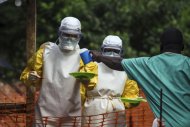Graphic explaining how the Ebola virus attacks the human body
Nigeria on Monday confirmed a new case of Ebola in the financial capital Lagos, bringing the total number of people in the country with the virus to 10.
Health minister Onyebuchi Chukwu said the latest confirmed case was a female nurse who came into contact with a Liberian-American man, Patrick Sawyer, who died of Ebola in a Lagos hospital on July 25.
In addition to Sawyer, another nurse who had contact with him died last week, while seven other people have been confirmed to have the virus in the city, he added.
"The 10th case actually was one of the nurses who also had primary contact with the index case. When he (Sawyer) got ill, we then brought her into isolation," the minister told a news conference in Abuja.
"We just tested her over the weekend. So, that's what made it 10. So, between Friday and today we had one additional case. That brings it to 10 and the 10 includes the index case."
Chukwu said the nurse was currently undergoing treatment while her husband was under surveillance.
The World Health Organization (WHO) said on Friday there were 13 probable and suspect cases of Ebola, including two deaths, in Nigeria.
The minister did not comment on the discrepancy in the figures.
The WHO is discussing the possible use of an experimental treatment to try to stem the spread of the deadly virus, which has claimed nearly 1,000 lives in four West African countries this year.
Nigeria has announced a number of measures to curb the spread of Ebola, including the declaration of a national emergency in line with WHO advice to trigger disaster response procedures.
President Goodluck Jonathan has announced greater funding to stop the spread such as setting up additional isolation centres, border screenings and contact tracing.
People in Africa's most populous nation and leading economy have been told to avoid large gatherings.
The authorities in Lagos, which is sub-Saharan Africa's largest city, have however appealed for volunteers because of a shortage of medical personnel exacerbated by a month-long doctors' strike.
The health minister on Monday confirmed that public sector doctors were pressing on with their stoppage after divisions within the National Medical Association union (NMA) created confusion.
NMA boss Kayode Obembe on Thursday announced the suspension of the strike citing the need to help tackle the Ebola crisis.
But other key players in the union refused to follow his directive, saying the government had not met any of their demands. Obembe has reportedly resigned as the NMA president.
The health minister on Monday said he was "pleading" with the union to return to work.
The Nigerian Red Cross Society (NRCS) meanwhile said it had activated all its volunteers to get across preventative measures to the public, particularly seeking early medical advice and treatment.
Secretary-general Bello Hamman Diram said 18 volunteers were assisting in areas such as contact tracing, health promotion, case management and public information schemes.
Some 300 other volunteers will be deployed to help the federal and Lagos State governments in providing protective equipment as well as educational and hygiene materials.
....In God we trust





